With customers shopping from any device they fancy, the whole ecommerce shopping experience has taken a new turn. You need to be where your customers are and understand how to increase customer engagement as it continuously evolves in ecommerce.
Infact, 73% of individuals report that their purchasing decisions are strongly influenced by the customer experience they receive. So, delivering an exceptional ecommerce experience isn’t just beneficial—it’s essential for maintaining customer engagement and loyalty.
In this blog, we delve into 9 powerful customer engagement strategies for ecommerce. These tactics foster enhanced interaction and significantly heighten the likelihood of conversions.
Top 9 Ways How to Increase Customer Engagement
There are numerous ways to increase customer engagement for ecommerce brands. But we’ve jotted down the top 9 that are proven to give you results in your marketing strategies.
1. Provide Omnichannel Experiences
Who doesn’t appreciate a seamless shopping experience? That’s precisely the promise of omnichannel marketing experience.
Omnichannel marketing ensures that customers can smoothly transition from mobile apps to websites to physical stores without interruption. Leveraging a robust customer engagement platform for ecommerce simplifies this process tremendously.
The outcome? Happier customers, increased sales, and soaring brand loyalty.
For example, GIVA’s Diwali promo offers via push notifications, WhatsApp, and SMS are perfect omnichannel marketing examples.
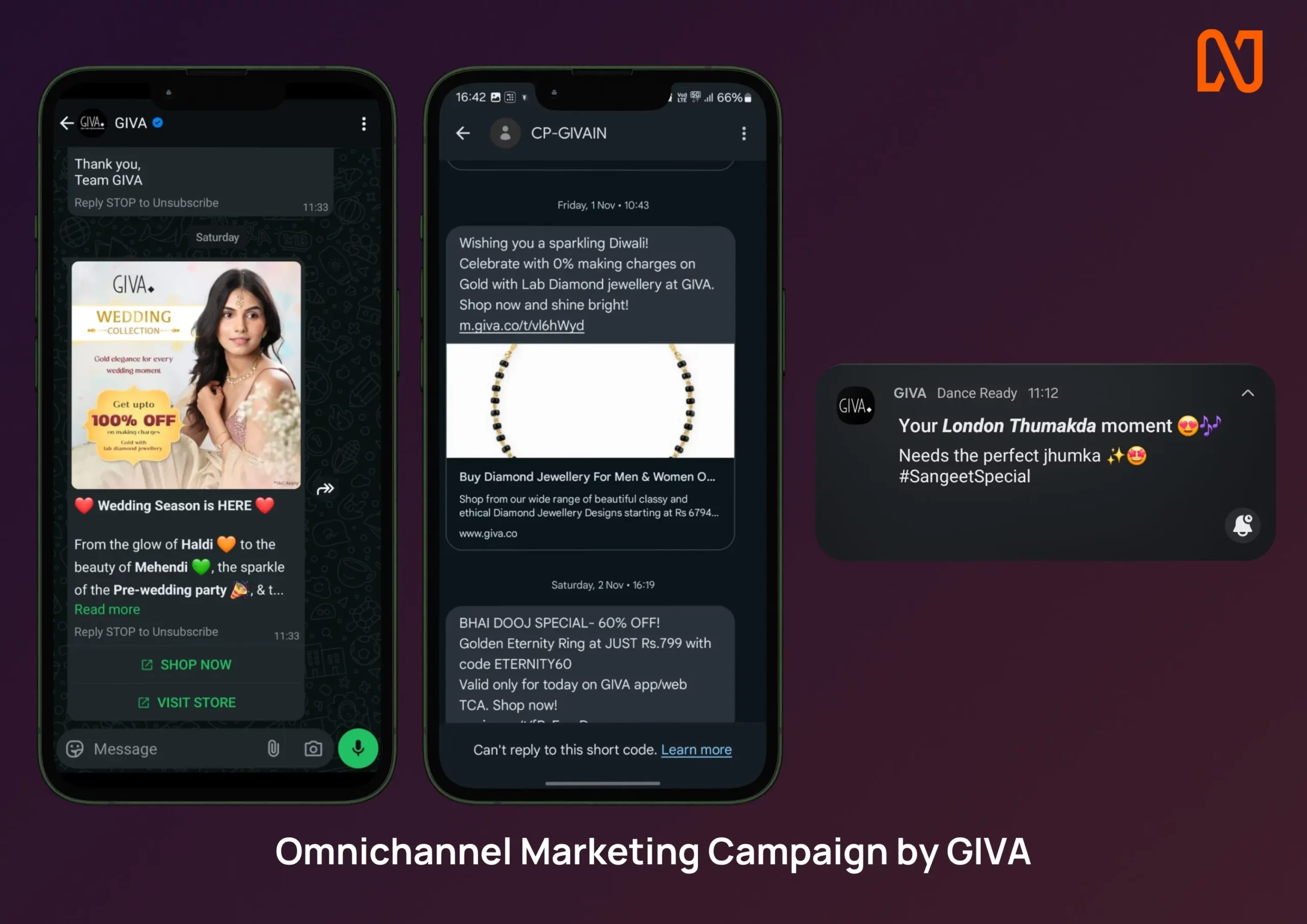
Not convinced? Here are some more benefits of omnichannel marketing that impact customer engagement:
Maintaining a consistent brand message is crucial. Imagine the confusion if every room you entered played a different song. That’s how customers feel when they encounter inconsistent brand messaging.
Omnichannel marketing ensures a unified tune across all channels. Whether customers find you on Instagram, your website, your app, or in a physical store, your brand message stays harmonious and consistent.
Everyone knows how frustrating it is to be shuffled between different channels just to get an answer.
With omnichannel marketing, whether your customers reach out via email, WhatsApp, or your website chat, they receive the same prompt and helpful response. They will no longer be redirected or told to contact a different support team.
Everything is streamlined through a customer engagement platform, making every interaction smooth and efficient.
Omnichannel marketing transcends mere selling to foster a deeper understanding of customer journeys.
By integrating data from multiple touchpoints, we understand where customers have been, where they are now, and where they might head next. This complete perspective is invaluable, helping to tailor more effective marketing strategies.
These insights are pure gold for crafting strategies to increase customer engagement for ecommerce brands.

With a comprehensive understanding of the customer journey, you’re set to provide tailored, luxury-like experiences that are now essential. Here’s why it’s a game-changer: Omnichannel shoppers who receive these personalized experiences tend to stay longer, showing a 30% increase in lifetime value.
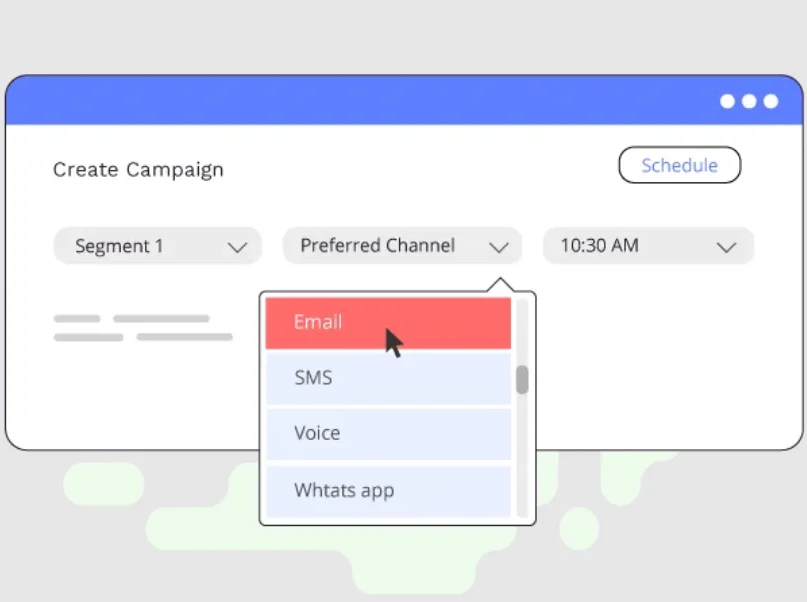
Moreover, brands excelling in omnichannel strategies retain an impressive 89% of their customers, far surpassing the 33% retention rates of those still adjusting to omnichannel approaches.
2. Use Chatbots
The beauty of chatbots is that they are available 24/7. They act like your assistant, addressing all queries and concerns customers may have.
What’s more, over 65% of consumers prefer interacting with businesses through messaging apps. To dive deeper, let’s explore additional chatbot benefits that could significantly enhance customer engagement for your ecommerce brand.
- Serving Personalized Shopping Experiences
Each customer is unique and expects a unique experience. Chatbots can craft personalized experiences for every visitor, akin to having a personal shopper for each one. These bots guide them through your digital aisles, enhancing their shopping experience.

- Providing Personalised Product Recommendations
Feeling swamped by choices can overwhelm your customers. That’s where bots come into play. They can act like intuitive store assistant who quickly grasps what you’re seeking and guides you accordingly.
For example, Epigamia also provides recommendations for its products depending on the requirements you type in the chat.
Instead of endless browsing, bots can recommend the ideal products, streamlining the shopping process and enhancing the experience.
For example, Epigamia also provides recommendations for its products depending on the requirements you type in the chat.
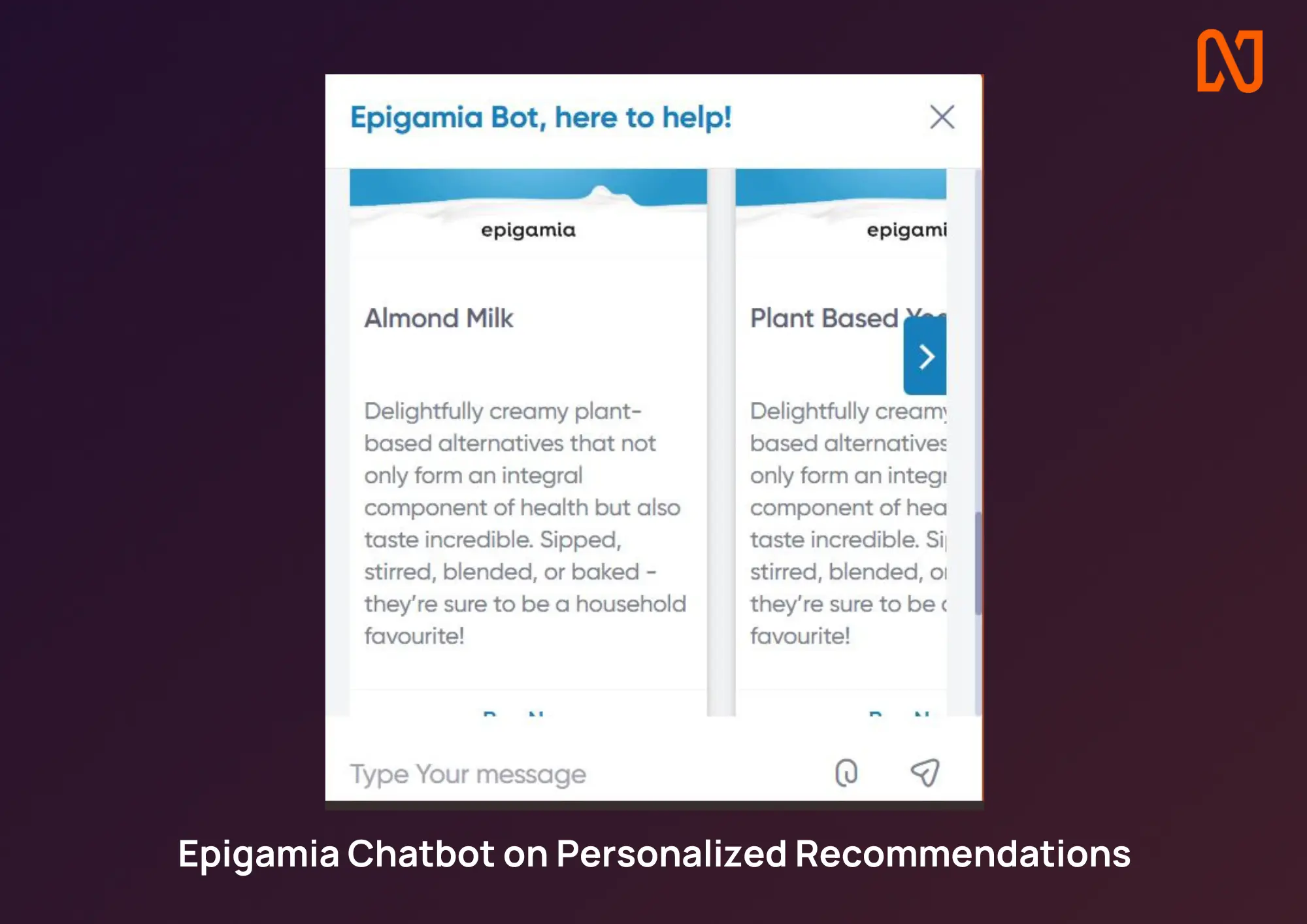
- Highly intuitive and self-learning capabilities
The magic of AI-powered chatbots lies in their intuitiveness. They swiftly catch your customers’ subtle cues to discern their intentions. Whether someone is browsing or ready to make a purchase, these bots smartly navigate the conversation to enhance the shopping experience.
Additionally, integrating these chatbots with your CRM through a customer engagement platform ensures every interaction is meticulously logged.
So, the next time that customer pops in, you know exactly how to tailor their experience.
3. Directly Include your Customers
There’s nothing more genuine than content created by our very own customers. Be it reviews, photos, or even videos, this user-generated content (UGC) is pure gold.
When engaging with negative reviews, users extend their site duration by 5x, leading to an impressive 85% boost in conversion rates.
Customer reviews play a vital role in establishing social proof. They serve as excellent tools to educate potential customers about top-selling items that exhibit remarkable performance and quality.
The synergy between customer reviews and ecommerce website profits is undeniable.
But remember, always keep it real. Authenticity is key. No one likes those made-up reviews or staged photos.
4. Loyalty is the New Currency
A well-crafted loyalty program leaves a lasting impression on your customers. Whether offering discounts, exclusive access to experiences, or stylish merchandise, these rewards entice customers to return.
Utilizing a customer engagement platform simplifies setting up and managing these programs, making it effortless to enhance your ecommerce customer engagement strategy through compelling loyalty incentives.
Loyalty programs offer significant advantages in ecommerce customer engagement marketing:
Loyalty programs make current customers feel valued, a critical aspect, as retaining customers costs far less than acquiring new ones (5x less, in fact).
Barista’s reward email below is a good example that piques curiosity with offers that are irresistible for customers.

With a loyalty program, you can pinpoint and re-engage lost customers, reducing customer attrition and enhancing loyalty.
Boosting shopping frequency naturally leads to higher customer lifetime value, maximizing their overall impact. A powerful ecommerce marketing platform uses RFM analysis to help predict users who are most likely to come back again and purchase products from your website or app.

Loyal customers repeatedly choose you for a reason. Loyalty programs enable you to identify potential brand influencers within this dedicated group.
Pro tip: Add tiers or levels to your program. It gives our customers that little extra push to reach the top
5. Maximizing Mobile Marketing
Mobile marketing has become essential, especially since 53.42% of web traffic now originates from mobile devices.
Marketing on mobile platforms offers distinct advantages:
- Accessibility: It’s always within reach, available any time and anywhere.
- Personalization: Mobile marketing can be highly customized using specific user data and mobile features.
Impactfulness: Utilizes various channels such as SMS, WhatsApp marketing, in-app, and push notifications, enhancing the overall effectiveness of marketing efforts.
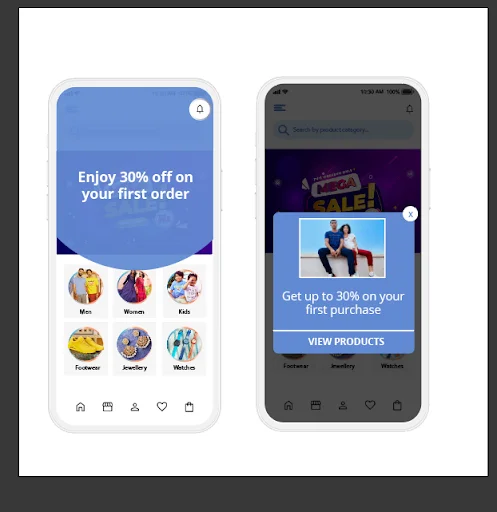
When discussing content, prioritizing a mobile-first approach is crucial. By leveraging a customer engagement platform, you can ensure that your content is not just mobile-friendly but also fully optimized for mobile devices, enhancing user interaction and accessibility.
It’s all about giving our customers that seamless, swipe-happy experience they crave.
Also Read: Personalizing the Experience on E-commerce Mobile Apps: A Guide
6. The Power of Push Notifications
Ever noticed how a little ‘ping’ on your phone grabs your attention? That’s the magic of push notifications.
Push notifications give better click rates and CTRs than traditional channels like email and SMS. Because they can appear right in front of the customer’s eyes, they’re a highly sought-after communication channel.
You can also spice up your push notifications with multiple interactive elements, rich media, timers and more. These add more appeal to your message, boosting your chances of customers clicking and engaging with your brand.
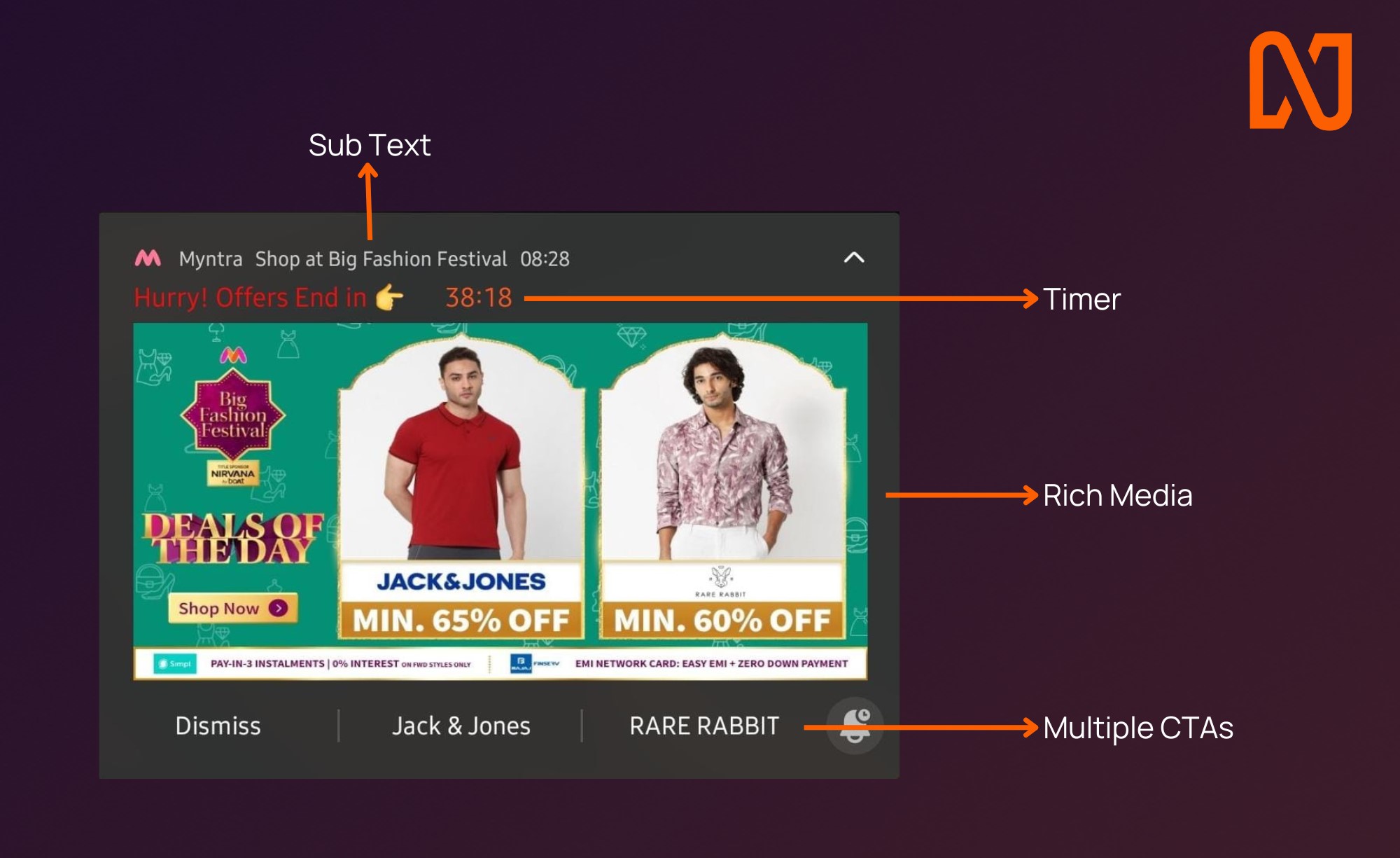
Whether it’s a flash sale or a new product drop, these notifications can drive real-time engagement. But remember, it’s a fine line between engaging and spamming. Let’s keep it relevant and not bombard our precious customers.
7. Personalize the Entire Shopping Experience
Your ecommerce site should feel like a personal wardrobe to your customers, making them eager to return each time they visit.
Customers want to feel special, and that’s where personalized content steps in. Tailoring your site and app to meet specific user interests is crucial if you want to capture attention.
Reports indicate that you can achieve up to a 31% increase in conversions post-personalization. This strategy not only demonstrates attentiveness to customer preferences but also significantly enhances their shopping experience, fostering loyalty and increasing conversion chances.

For a more in-depth look at the best ecommerce strategies, insights, and benchmarks, download our ecommerce mindscape report.
For instance, someone searching for pillows should see suggestions for pillows and other related products like pillow covers, while a visitor interested in jewelry might find gift recommendations.
Indeed, a staggering 91% of customers prefer shopping with brands that offer personalized interactions and recommendations, emphasizing the importance of giving every visitor a VIP experience.
With our advanced analytics capabilities and Co-marketer AI, you can craft content that resonates deeply with each customer. It’s like engaging in a personal conversation, showing customers you truly understand their preferences and needs. This targeted approach helps build a connection that feels genuine and attentive.
Calculate the potential ROI uplift you can achieve with personalization using our web personalization calculator..
8. Keep Taking Continuous Feedback
Want to know the secret sauce to perfect content? It’s feedback.
Our customers are our best critics and cheerleaders. Understanding and working on customer feedback shows that brands listen to their customers, and in turn, customers come back and bring along their friends.
Gathering feedback is a powerful approach to minimize shopping cart abandonment, a concern seen in approximately 77.3% of online orders. By employing exit feedback forms, you can gain valuable insights into the reasons behind visitors exiting the checkout process.
9. Social Media: Your Digital Storefront
Ecommerce platforms with a presence on social media experience an average of 32% higher sales compared to those without one. The prowess of social media is such that users are now shopping directly on platforms like Instagram and TikTok.
By posting regularly, engaging creatively, and incorporating user-generated content, you can cultivate a vibrant online community. Remember, each interaction on social media—be it a comment, like, or share—helps fortify a loyal customer base, turning casual browsers into dedicated followers.
The Future of Ecommerce for Customer Engagement
Ecommerce enterprises that solely prioritize sales risk losing a substantial customer base. Modern consumers seek personalized interactions and demand to be recognized as individuals.
As we forge ahead, websites that embrace ecommerce personalization will attract a thriving customer base. If your ecommerce venture aims to amplify customer engagement, integrating personalized strategies becomes paramount, significantly influencing customer lifetime value (CLTV).
Strategic utilization of customer data empowers you to provide tailor-made promotions, acknowledge returning patrons, and anticipate their preferences. Search personalization and visual search are also two hot trends that will change the shopping experience on ecommerce apps and websites.
The impact of personalized customer service is striking, delivering transaction rates six times higher than generic communication.
Investing in this endeavor is undoubtedly worthwhile.
Conclusion
As the ecommerce landscape rapidly evolves, figuring out how to increase customer engagement with your customers is more crucial than ever.
From omnichannel experiences to personalized interactions, brands that harness these innovative strategies can create memorable shopping journeys that foster loyalty, increase conversion rates, and build lasting relationships.
Embracing a customer-first approach, powered by data-driven insights and seamless digital experiences, is not just a strategy—it’s a necessity in today’s competitive market. By implementing these top customer engagement tactics, your brand will be well-equipped to meet, and even exceed, modern consumer expectations.
Now is the time to leverage these insights and start transforming your customer experience for a prosperous future in ecommerce.












